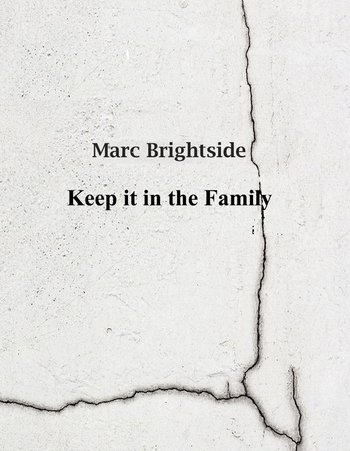
"Why do you think we write about ourselves?"
Keep it in the Family is the first poetry collection by British author Marc Brightside, published in late 2017. The collection is based largely around ideas relating to lying, and explores this theme through a three-chapter narrative of depression, cynicism and repressed suicidal urges. Others topics that are covered include alienation, relationships and self-fulfillment.
Keep it in the Family contains examples of:
- Abusive Parents: Paternal example.
- Bread, Eggs, Breaded Eggs: Used in "Flashbacks".
- Caustic Critic: Towards more or less everyone.
- Driven to Suicide/Bungled Suicide: One way or another represented in "Two for Two" and "Question No Answer". Heavily implied in "Still".
-
 Genius Bonus: "A Death in Amsterdam" contains references to obscure medical terminology and genetic defects.
Genius Bonus: "A Death in Amsterdam" contains references to obscure medical terminology and genetic defects. - Hypocritical Humor: Evident throughout, but most obvious in "Soybeans and Sorbitol" and "Stop Calling Me People".
- Metafiction: Certainly contains elements of this, what with the constant lampshading and subverting of modern poetic tropes. The opening poem, "Person, I", provides the most definitive example of this.
- Narrative Poetry: The book's most defining aspect, to the extent that the collection is arguably structured more like a novel, with arcing narratives and recurring characters that appear in multiple poems across all three chapters.
- The Nicknamer: Demonstrated a few times, usually by referring to them through some variation of The Noun Who Verbed. Most notably with the ex-girlfriend/fiancée character, who is consistently called The Westward Guest.
- Old Shame: Brightside doesn't seem to think too highly of this collection anymore, based on some derisive comments and references made in his future poems, despite it containing his most widely circulated and celebrated poem ("Eleven Years of May").
- Rule of Three: Lampshaded in "Lightly Buttered" and played straight in places throughout.
- Second-Person Narration: Used in a few places, most noticeably in "Hello, I'm in Eastleigh".
- Take That!: Towards Ayn Rand in "Influence-A" and infamously Rupi Kaur in "Soybeans and Sorbitol".
- True Art Is Angsty: Lampshaded, played straight, mocked and generally explored throughout the collection.
- Wham Line: Many, but the ending of "Dirty Blood" stands out
